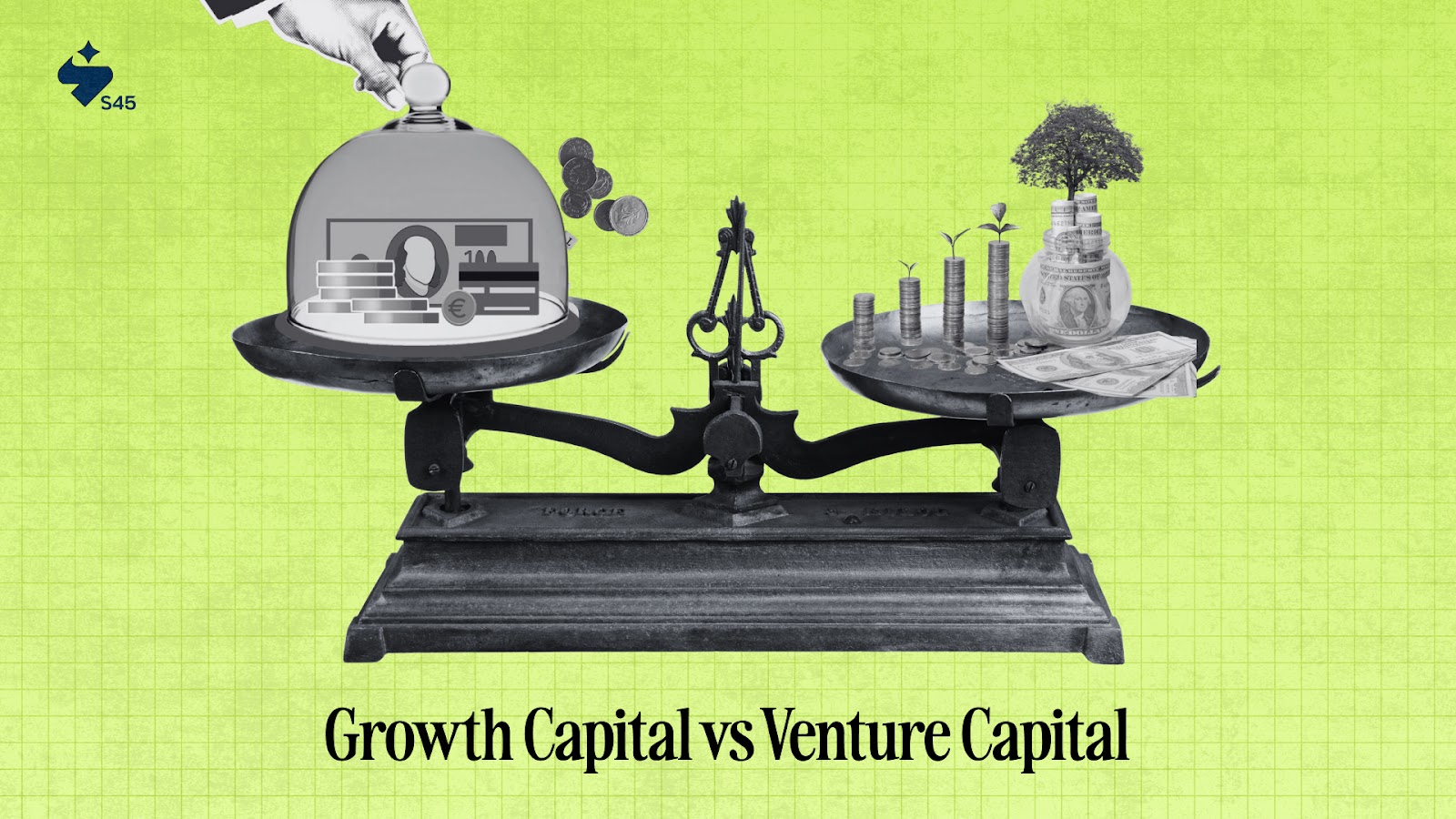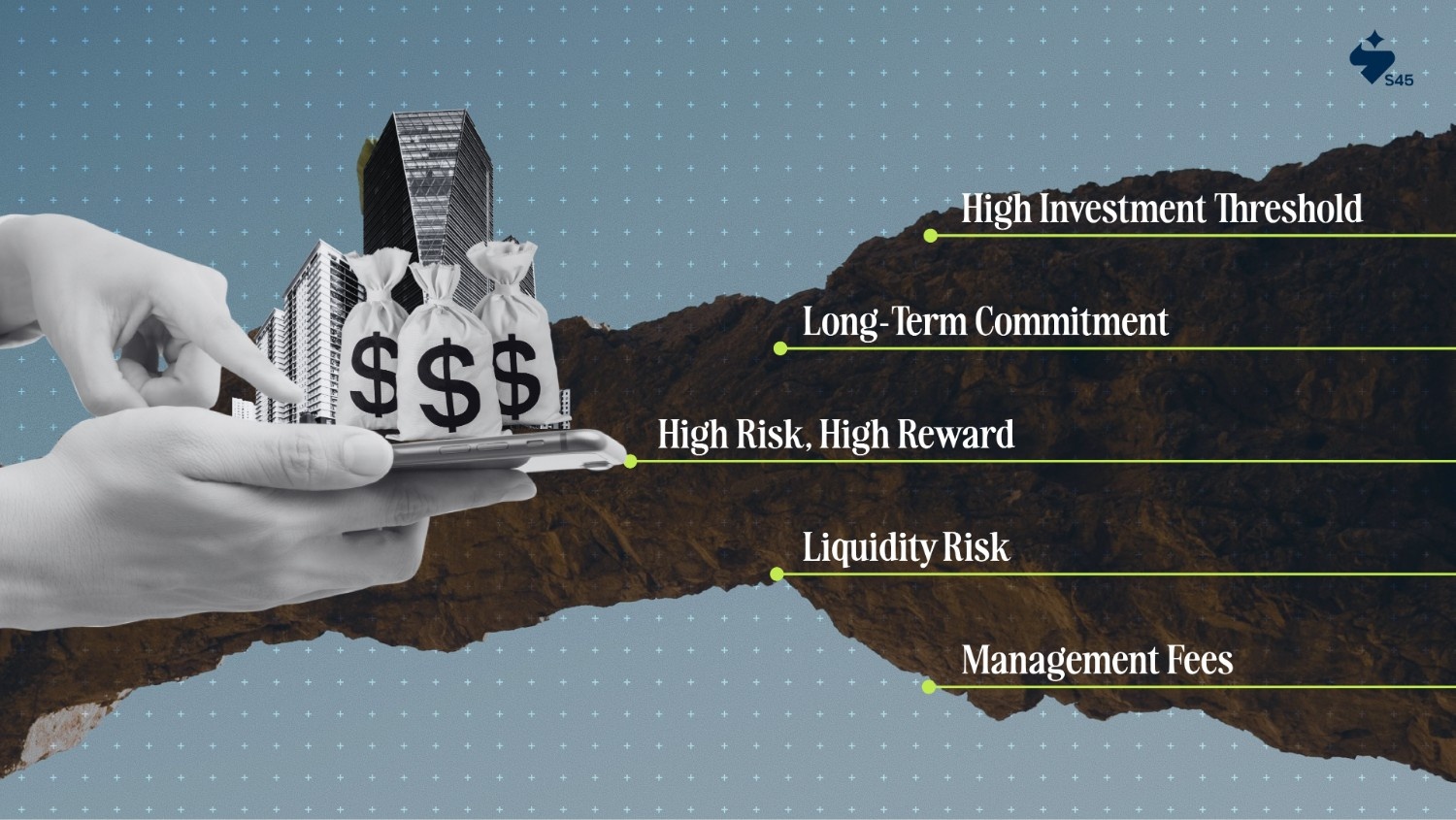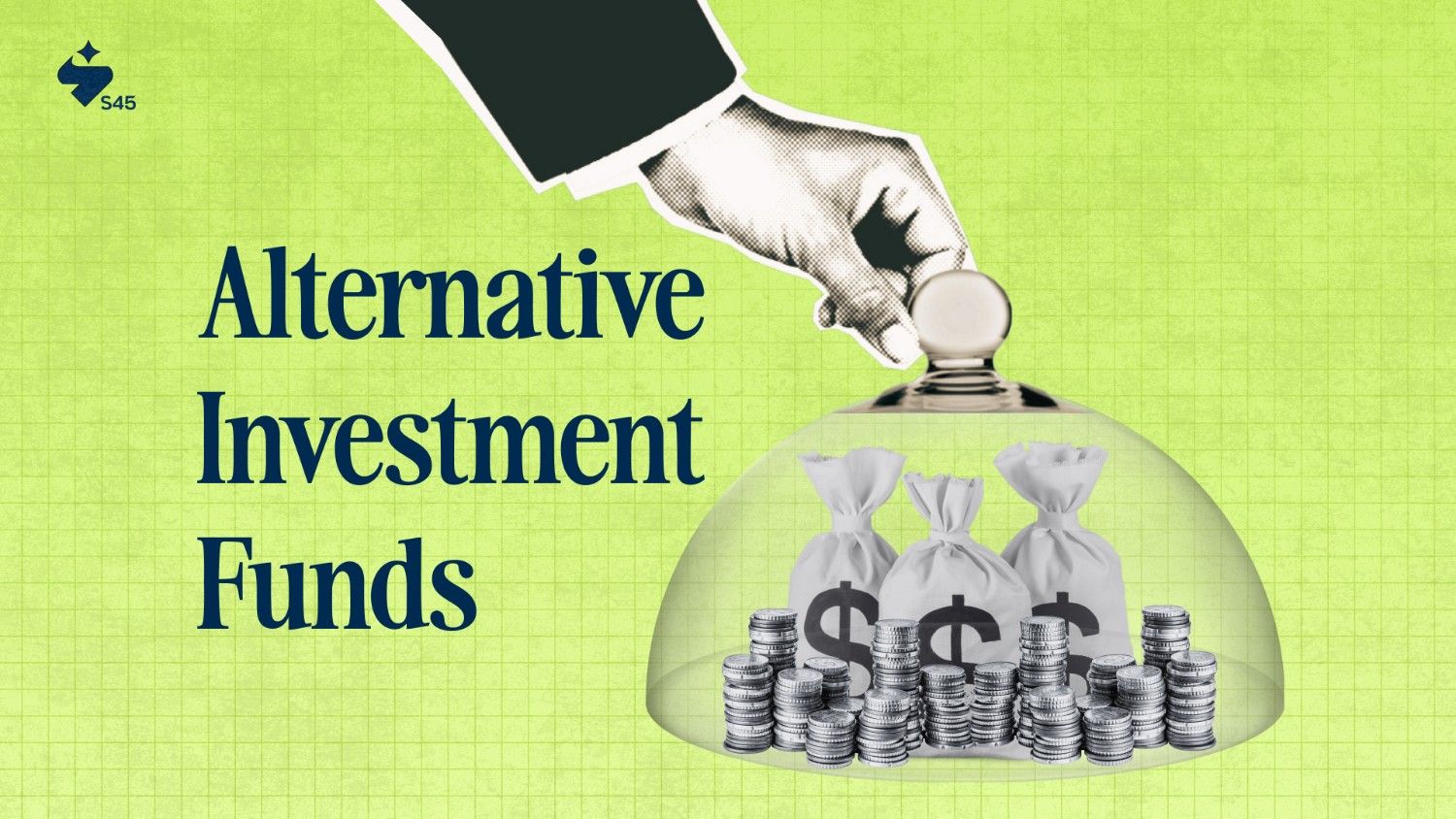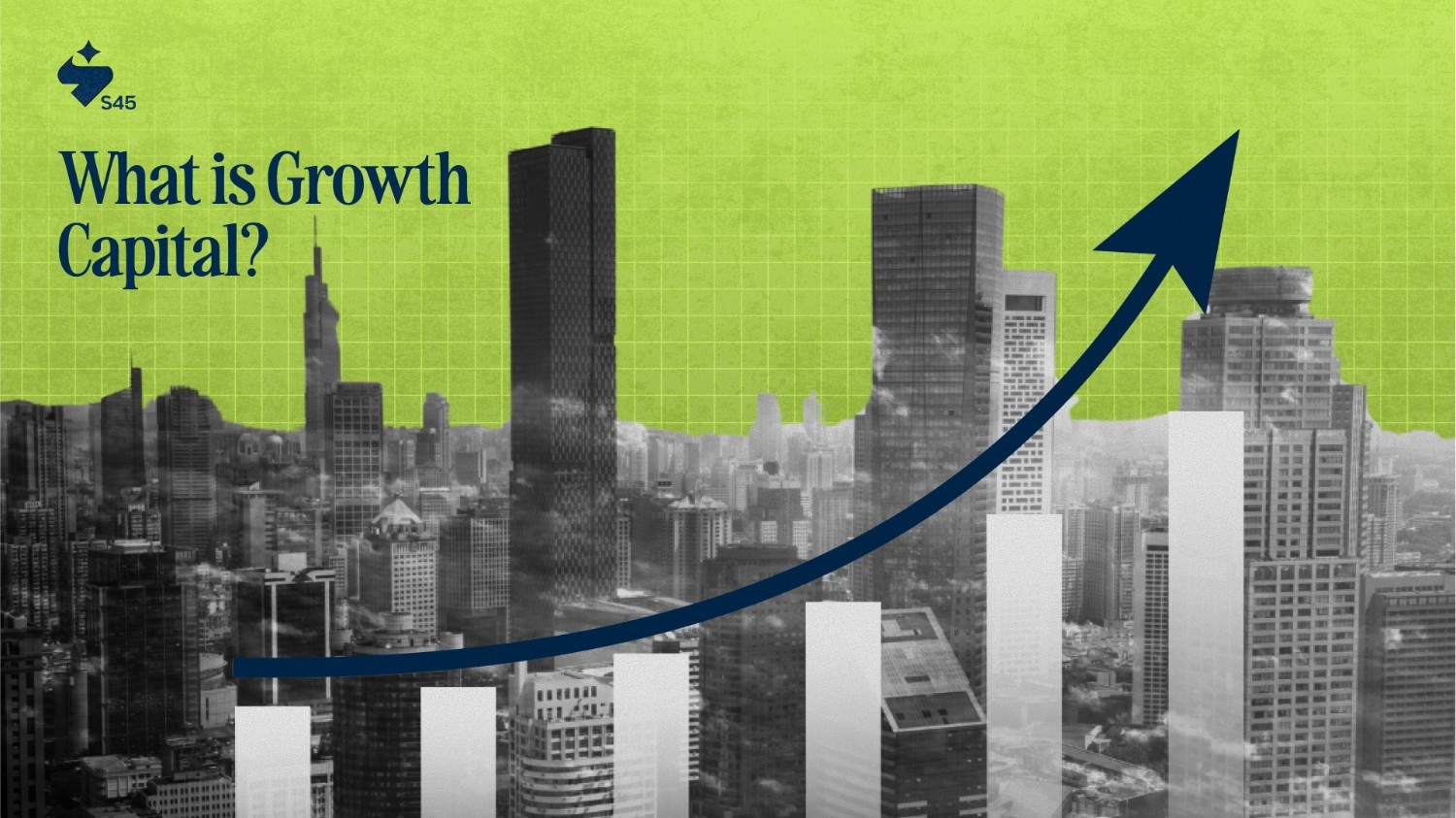
- Alternative Investment Funds (AIFs) offer a way for MSME founders to diversify their investments beyond traditional stocks and bonds.
- Category I and II AIFs pass through taxes to investors, while Category III AIFs are taxed at the fund level, impacting returns.
- AIFs include private equity, real estate, hedge funds, and venture capital, each with varying risk levels and returns.
- AIFs are designed for long-term investments, making them ideal for founders focused on building lasting wealth.
- At S45 Club, we provide expert advice and capital to help you navigate AIFs and make smart investment choices for your business.
As a founder of an MSME, you’re no stranger to taking risks and making calculated decisions to drive your business forward. Beyond running your company, managing your wealth and investment portfolio is just as important.
However, relying solely on stocks and fixed deposits exposes your wealth to market volatility and restricts growth opportunities. Alternative Investment Funds (AIFs) provide an opportunity for you to diversify your investments and take advantage of high-return, non-traditional asset classes.
India's 1,550 registered AIFs have attracted commitments that soared by almost 32% to ₹5.38 trillion for FY 2024-25, rising sharply from ₹4.07 trillion just one year ago.
These numbers show that founders and investors are actively seeking alternative avenues to balance risk, diversify their holdings, and seize high-growth opportunities in sectors like technology, private equity, and real assets.
Let’s explore how AIFs can play a role in your financial growth strategy.
What Are AIFs and Why Should You Care?
AIFs are funds that pool money from investors and invest it into non-traditional assets like real estate, private equity, and even hedge funds. These types of investments can offer you the chance to diversify your portfolio and grow your wealth without being tied to the performance of the stock market.
As a founder, this is your chance to step away from the volatility of the stock market and invest in more stable, high-return options.
Now, you might be asking, "How are these different from a mutual fund?"
What Makes AIFs Different from Traditional Investments?
These funds are different from what you might be used to in the traditional investment space, and that’s what makes them a compelling option.
AIFs stand out from traditional investments in several ways.
- Firstly, they are not easily accessible to the general public. They are typically for a select group of wealthy individuals and institutional investors.
- The minimum investment is usually high, making it a "big-ticket" item.
- They also have a long lock-in period, which means you can't just pull your money out whenever you want. This is because the assets they invest in, like a startup or a real estate project, take time to mature.
- The fund manager has a lot of flexibility in how they invest, which is a key characteristic. This allows them to be more agile and potentially capture opportunities that traditional funds might miss.
- The returns are also not guaranteed and can be high, but they come with a higher risk.
Strategic platforms like S45 can guide you in exploring investment strategies, including AIFs, that fit your growth ambitions. Together, we can help you build both your business and personal wealth.
To help you make sense of the landscape, the Indian capital markets regulator, SEBI, has sorted AIFs into different categories. Each has a different investment focus, so you can see which one might be the best fit for your growth strategy.
The Different Types of AIFs: Which One Is Right for You?
As you consider AIFs, it’s important to know that they are divided into three categories. Each category has its own focus and investment strategy, making it easy to pick one that aligns with your financial goals and risk appetite.
Category I AIFs: The Nation Builders
These funds are for investments that the government sees as a priority for economic growth. These funds invest in areas like start-ups, SMEs, and sectors that align with government priorities. They typically carry less risk and are great if you're looking to support emerging businesses while earning returns.
As a founder, you'll find these interesting because they often invest in the very ecosystems you're a part of. Examples include:
- Venture Capital Funds: These funds invest in early-stage startups with big growth potential, which might even be a source of capital for your own business someday.
- Infrastructure Funds: As the name suggests, they invest in infrastructure projects like roads and power plants.
- SME Funds: These funds are specifically designed to invest in small and medium-sized enterprises.
Category II AIFs: The Flexible Growth Drivers
These funds focus on private equity and debt. They’re a bit riskier than Category I AIFs but offer higher returns. This category might appeal to you if you're open to higher-risk, higher-reward opportunities.
This makes them great for a long-term investment strategy. The most common examples are:
- Private Equity Funds: These funds invest in established, private companies, much like yours, to help them grow and then sell their stake for a profit.
- Real Estate Funds: They pool money to invest in various real estate projects, from commercial to residential.
- Distressed Asset Funds: These funds buy assets from struggling companies at a discount, aiming to turn them around.
Category III AIFs: The Active Traders
These are more complex and include hedge funds that focus on short-term returns. They can borrow money and use leverage to make their investments.
They are more focused on quick returns and can invest in a wider range of assets, including publicly traded stocks. If you’re looking for quick, high returns, this category could be the right fit, but be aware that it also carries more risk.
At S45, we help founders assess their financial goals and choose the AIF category that fits their vision. Whether you want to diversify or maximize returns, we provide the support and advice you need to make informed decisions.
If you're still on the fence, let’s take a look at why AIFs could be a great choice for your portfolio.
Why AIFs Could Be Your Next Smart Investment

While traditional investments can be limiting, AIFs provide greater flexibility and higher potential for returns. Here’s why you might want to consider them:
- High-Growth Potential: AIFs invest in unique opportunities that can deliver significant returns, often much higher than traditional investments.
- Diversification: Adding AIFs to your portfolio helps spread risk beyond just stocks and bonds. This can make your portfolio more resilient to market volatility.
- Access to Experts: When you invest in an AIF, you get access to the expertise of a professional fund manager who has deep knowledge of the specific industry or asset class.
- Collaboration: AIFs often come with a team of experts who can provide strategic advice, operational guidance, and valuable network connections. This isn't just a financial transaction; it's a partnership.
- Control Over Your Investments: As a founder, you’re used to making strategic decisions. AIFs allow you to choose investments that match your goals and risk tolerance, giving you more control over how your money is managed.
But when you’re investing in AIFs, understanding the tax implications is crucial to making smart decisions.
Tax Considerations You Should Know About
Understanding how returns are taxed is crucial for long-term growth, cash flow predictability, and reinvestment strategies. Knowing the tax rules for each category helps maintain control, stay compliant, and make smart decisions that align with your vision.
Category I & II Tax Framework
Category I and II AIFs enjoy pass-through tax status under Section 115UB of the Income Tax Act. This means the income is not taxed at the fund level but passed directly to investors. Investors then pay tax based on the income received.
- Long-term capital gains from selling listed equities or equity-oriented funds are taxed at 12.5%, after an exemption of ₹1.25 lakh. (This rate was 10% before 23rd July 2024).
- For other stocks and shares, capital gains are taxed at 12.5% without the benefit of indexation.
This structure ensures transparency, making it easier for investors to understand their tax obligations. It also allows founders to focus on building their business without worrying about complex tax issues.
Category III Tax Norms
Category III AIFs are taxed differently. Tax is applied at the fund level rather than passed to investors. The tax is based on the type of gains:
- Business income is taxed at the highest marginal rate.
- Capital gains are taxed at applicable long-term or short-term rates.
For founders and high-growth entrepreneurs, this tax setup has important implications. Since the fund-level tax is settled before distributions, investors have less control over the timing of tax liabilities.
While Category III AIFs allow for more complex strategies, such as hedge fund-style investments, the tax treatment means you need to carefully evaluate the post-tax returns. The tax burden here can significantly impact your cash flow and overall returns compared to Category I and II funds.
However, before you jump in, it's crucial to consider a few drawbacks of AIFs.
The Drawbacks: What to Keep in Mind

No investment is without its drawbacks. While AIFs offer many benefits, there are also some disadvantages to be aware of. Understanding these drawbacks will help you make an informed decision.
- High Investment Threshold: AIFs require a significant financial commitment. Make sure you are comfortable with the amount and that it's a small part of your overall investment portfolio.
- Long-Term Commitment: Remember the lock-in period. You won't be able to access your money for a while, so make sure you don't need it for any immediate needs.
- High Risk, High Reward: AIFs can offer high returns, but they also carry a higher risk. Be prepared for potential losses, as returns are not guaranteed.
- Liquidity Risk: Since AIFs invest in unlisted and often illiquid assets, it might be difficult to sell your investment quickly if you need to.
- Management Fees: AIFs come with management fees, and these can eat into your returns over time. Always weigh the fees against the potential returns.
Considering the drawbacks of AIFs, you must be wondering if you should invest in AIFs.
Key Factors to Think About Before You Invest
Before diving into an AIF, it’s important to evaluate whether it’s the right fit for your business and financial goals.
- Investment Horizon: AIFs are long-term investments. If you’re looking for short-term liquidity, AIFs might not be the best fit.
- Fund Manager’s Track Record: Check the expertise and history of the fund managers to ensure they have a solid track record.
- Risk Tolerance: Understand your comfort level with risk. Some AIFs are riskier than others, so choose one that aligns with your financial goals.
- Fee Structure: Review the fees carefully to ensure they are in line with the potential returns you expect.
It's always a good idea to consult a tax advisor to understand the specific implications for your situation.
S45: Your Partner in Building a Legacy
As a founder, you’re constantly looking to build wealth and grow your business. AIFs could be the solution you’ve been seeking, offering both higher returns and the opportunity to diversify your portfolio. However, they come with risks.
At S45, we believe in building businesses that last. We understand that as a founder, you're not just looking for capital; you're looking for a partner who walks beside you.
Our focus on:
- Legacy Through Innovation and Sustainable Summit aligns perfectly with the long-term vision of AIFs.
- We can help you navigate the world of alternative investments, providing the right expertise and network to help your business scale sustainably.
- We believe in trust, and we want to build a community that can grow together. We are not just investors; we are your partners in growth.
If you’re ready to explore AIFs and other investment strategies, S45 is here to guide you every step of the way. Book a consultation today to take your wealth-building strategy to the next level.
Frequently Asked Questions
Q1: Are AIFs a good option for MSME founders?
Yes, AIFs can be an excellent option for MSME founders who are looking to diversify their investments and build long-term wealth.
Q2: How much do I need to invest in AIFs?
The typical minimum investment in an AIF is ₹1 crore, which may be higher than traditional investments.
Q3: Are AIFs regulated in India?
Yes, AIFs are regulated by the Securities and Exchange Board of India (SEBI), ensuring they comply with investment standards.
Q4: How long should I be prepared to hold my investment in AIFs?
AIFs generally require a commitment of 3 to 7 years, so they are best for long-term investors.


